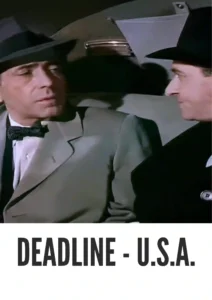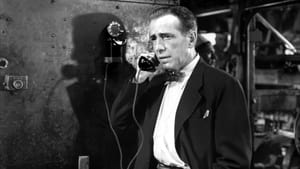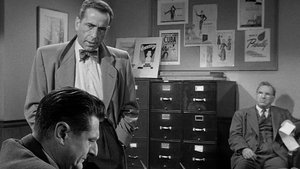Contact: [email protected]
Video Sources 0 Views
- Watch trailer
- Deadline - U.S.A.


Synopsis
Table of Contents
ToggleReview: Deadline – U.S.A. (1952) – A Riveting Chronicle of Journalism’s Noble Pursuit

Introduction
Deadline – U.S.A., released in 1952, stands as a captivating drama directed by Richard Brooks. Set within the bustling world of newspaper journalism, this film offers a poignant exploration of integrity, courage, and the relentless pursuit of truth. In this review, we’ll delve into the compelling narrative of Deadline – U.S.A. and its enduring relevance in today’s media landscape.
Check The Full Colorized Movies List
Check Our Colorized Movies Trailer Channel
Understanding Deadline – U.S.A. (1952): Director, Cast, and Genre
Directed by Richard Brooks, Deadline – U.S.A. features a talented ensemble cast led by Humphrey Bogart and Ethel Barrymore. The film falls within the drama genre, known for its exploration of complex human emotions and societal issues.
Exploring the World of Deadline – U.S.A. (1952): Plot and Characters
Deadline – U.S.A. follows the dedicated journalists of The Day, a struggling newspaper facing imminent closure. As the paper’s owner and editor, Ed Hutcheson (Humphrey Bogart) fights to keep the publication alive amid corporate pressures and external threats. When a murder investigation uncovers corruption and collusion at the highest levels of government, Ed and his team embark on a race against time to expose the truth and uphold the integrity of their profession. Along the way, they confront personal and professional challenges, testing the limits of their courage and conviction.
The Art of Film Colorization
While Deadline – U.S.A. was originally filmed in black and white, its early colorized version adds a new dimension to its visual storytelling and atmospheric depth. The colorization process enhances the film’s evocative cinematography and captures the vibrant energy of New York City, immersing viewers in the bustling world of newspaper journalism with authenticity and nuance.
Early Colored Films: A Brief History
The history of early colored films is marked by innovation and experimentation as filmmakers sought to enhance the visual appeal of their movies. From hand-tinted frames to groundbreaking technicolor processes, the evolution of colorization techniques transformed the cinematic landscape, offering audiences a new way to experience their favorite stories.
Deadline – U.S.A. (1952) and Its Early Colored Version
The decision to release Deadline – U.S.A. in a colorized format was made with the intention of immersing audiences in the vibrant world of newspaper journalism and enhancing the film’s visual appeal. While some purists may prefer the original black and white version, the early colorized edition of the film adds a new layer of depth to its storytelling and captures the dynamic spirit of its characters and setting.
The Debate Over Film Colorization
The debate over film colorization continues to divide audiences and industry professionals alike. While some argue that colorization enhances the visual appeal of classic films and makes them more accessible to modern audiences, others maintain that it compromises the artistic integrity of the original work. As technology advances and filmmaking techniques evolve, the debate over colorization remains a topic of ongoing discussion within the film community.
Examining Deadline – U.S.A. (1952) as an Early Colored Film
Viewing Deadline – U.S.A. in its early colorized iteration offers audiences a fresh perspective on its dynamic characters and immersive storytelling. The colorization process enhances the film’s atmospheric cinematography and brings to life the vibrant energy of New York City, immersing viewers in the bustling world of newspaper journalism with authenticity and nuance. As Ed Hutcheson and his team navigate the challenges of their profession, their relentless pursuit of truth and justice resonates with timeless themes of integrity, courage, and the enduring power of the press.
Influence and Legacy: Deadline – U.S.A. (1952)’s Impact on Cinema
Deadline – U.S.A. is widely regarded as a stirring and inspirational drama that celebrates the noble ideals of journalism and the importance of holding power to account. Its portrayal of Ed Hutcheson and his team’s relentless pursuit of truth has inspired audiences around the world and influenced the depiction of investigative journalism in popular culture. As a testament to its enduring relevance, Deadline – U.S.A. remains a poignant reminder of the vital role that a free and independent press plays in society.
Director’s Cinematic Legacy: Beyond Deadline – U.S.A. (1952)
Richard Brooks’ directorial legacy extends far beyond Deadline – U.S.A., encompassing a diverse body of work that spans multiple genres and styles. As a filmmaker, Brooks was known for his ability to tell compelling stories with depth and authenticity, as evidenced by his masterful direction of Deadline – U.S.A.. The film stands as a testament to his talent and creativity, solidifying his reputation as one of the great directors of his time.
Themes Explored in Deadline – U.S.A. (1952)
At its core, Deadline – U.S.A. explores themes of integrity, courage, and the relentless pursuit of truth in the face of adversity. Through its compelling narrative and nuanced characters, the film delves into the complexities of journalistic ethics and celebrates the unwavering dedication of those who seek to uncover the truth. As Ed Hutcheson and his team confront corruption and injustice, their story serves as a powerful reminder of the importance of a free and independent press in holding power to account.
Reception and Controversy Surrounding Deadline – U.S.A. (1952)
Upon its release, Deadline – U.S.A. received widespread critical acclaim for its gripping narrative, evocative cinematography, and powerhouse performances. However, the decision to release the film in a colorized format sparked debate among fans and critics alike. While some praised the colorization process for enhancing the film’s visual appeal, others questioned its necessity and expressed concern about preserving the integrity of Brooks’ original vision.
Where to Watch Deadline – U.S.A. (1952) Online
For those eager to experience Deadline – U.S.A. for themselves, the film is readily available on popular streaming platforms such as Amazon Prime Video, Google Play Movies, and iTunes. Whether viewed in its original black and white format or its early colorized iteration, Deadline – U.S.A. offers a captivating and thought-provoking cinematic experience that is sure to leave a lasting impression.
FAQs About Deadline – U.S.A. (1952)
1. Is Deadline – U.S.A. based on a true story?
Deadline – U.S.A. is a fictionalized portrayal of newspaper journalism and the relentless pursuit of truth. While the film’s characters and storyline are works of fiction, its exploration of journalistic ethics draws inspiration from real-life events and historical figures.
2. Who starred in Deadline – U.S.A.?
Deadline – U.S.A. stars Humphrey Bogart as Ed Hutcheson, the dedicated editor of The Day, and Ethel Barrymore as Margaret Garrison, the newspaper’s owner. Their compelling performances bring depth and authenticity to their respective roles, elevating the emotional resonance of the film and capturing the spirit of journalistic integrity.
3. What is the central conflict of Deadline – U.S.A.?
At its core, Deadline – U.S.A. revolves around the central conflict between journalistic integrity and corporate interests. As Ed Hutcheson and his team fight to keep The Day alive amid external pressures and internal challenges, they must confront personal and professional dilemmas that test the limits of their courage and conviction.
4. Why was Deadline – U.S.A. released in a colorized format?
The decision to release Deadline – U.S.A. in a colorized format was made with the intention of immersing audiences in the vibrant world of newspaper journalism and enhancing the film’s visual appeal. While some purists may prefer the original black and white version, the early colorized edition of the film adds a new layer of depth to its storytelling and captures the dynamic spirit of its characters and setting.
5. What is the legacy of Deadline – U.S.A.?
Deadline – U.S.A. is widely regarded as a stirring and inspirational drama that celebrates the noble ideals of journalism and the importance of holding power to account. Its portrayal of Ed Hutcheson and his team’s relentless pursuit of truth has inspired audiences around the world and influenced the depiction of investigative journalism in popular culture.
6. Are there any sequels or remakes of Deadline – U.S.A.?
No, there are no direct sequels or remakes of Deadline – U.S.A.. However, the film’s enduring legacy and timeless themes have left an indelible mark on the portrayal of journalism in cinema, inspiring countless imitators and influencing the way media is depicted onscreen.
7. Where can I watch Deadline – U.S.A. online?
For those eager to experience Deadline – U.S.A. for themselves, the film is readily available on popular streaming platforms such as Amazon Prime Video, Google Play Movies, and iTunes. Whether viewed in its original black and white format or its early colorized iteration, Deadline – U.S.A. offers a captivating and thought-provoking cinematic experience that is sure to leave a lasting impression.
Conclusion
In conclusion, Deadline – U.S.A. remains a poignant and thought-provoking drama that celebrates the noble ideals of journalism and the importance of holding power to account. Whether viewed in its original black and white format or its early colorized iteration, Richard Brooks’ classic film offers a compelling exploration of integrity, courage, and the relentless pursuit of truth in the face of adversity. As viewers immerse themselves in the gripping world of newspaper journalism, they are reminded of the vital role that a free and independent press plays in society, making Deadline – U.S.A. a timeless cinematic gem that continues to resonate with audiences around the world.












